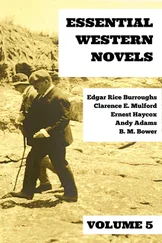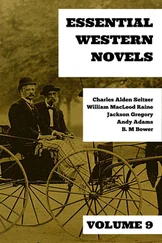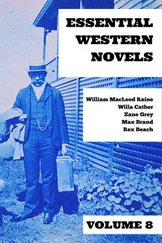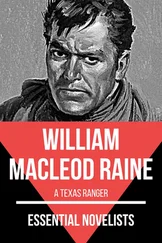"You're so good!"
"After I've been around you a while. It's catching." He tucked in the dust robe, without looking at her.
But she looked at him, as she started, with that swift, shy glance of hers, and felt the pink tint her cheeks beneath the tan. He was much in her thoughts, this slender brown man with the look of quiet competence and strength. Ever since that night in the kitchen, he had impressed himself upon her imagination. She had fallen into the way of comparing him with Tom Dixon, with her own brother, with Buck Weaver—and never to his disadvantage.
He talked with a drawl. He walked and rode with an air of languid ease. But the man himself, behind the indolence that sat upon him so gracefully, was like a coiled spring. Sometimes she could see this force in his eyes, when for the moment some thought eclipsed the gay good humor of them. Winsome he was. He had already won her father, even as he had won her. But the touch of affection in his manner never suggested weakness.
From the porch Tom Dixon watched her departure sullenly. Since he could not have her, he let himself grow jealous of the man who perhaps could. And because he was what he was—a small man, full of vanity and conceit—he must needs make parade of himself with another girl in the role of conquering squire. Larrabie smiled as the young fellow went off for a walk in obviously confidential talk with Anna Allan, but he learned soon that it was no smiling matter.
Half an hour later, the girl came flying back along the trail the two had taken. Catching sight of Keller, she ran across to him, plainly quivering with excitement and fluttering with fears.
"Oh, Mr. Keller—I've done it now! I didn't think——I thought—"
"Take it easy," soothed the young man, with one of his winning smiles. "Now, what is it you have done?" Already his eyes had picked out Dixon returning, not quite so impetuously, along the trail.
"I told him about the man in Phyllis' room."
Larrabie's eyes narrowed and grew steely. "Yes?"
"I told him—I don't know why, but I never could keep a secret. I made him promise not to tell. But he is going to tell the boys. There he comes now. And I told Phyllis I wouldn't tell!" Anna began to cry, miserably aware that she had made a mess of things.
"I just begged him not to tell—and he had promised. But he says it's his duty, and he's going to do it. Oh, Mr. Keller—if Mr. Weaver is there they will hurt him, and I'll be to blame."
"Yes, you will be," he told her bluntly. "But we may save him yet—if you can go about your business and keep your mouth shut."
"Oh, I will—I will," she promised eagerly. "I'll not say a word—not to anybody."
"See that you don't. Now, run along home. I'm going to have a quiet little talk with that young man. Maybe I can persuade him to change his mind," he said grimly.
"Please—if you could. I don't want to start any trouble."
Larrabie grinned, without taking his eyes from the man coming down the trail. It was usually some good-natured idiot, with a predisposition to gabbling, that made most of the trouble in the world.
"Well, you be a good girl and padlock your tongue. If you do, I'll fix it up with Tom," he promised.
He sauntered forward toward the path. Dixon, full of his news, was hurrying to the ranch. He was eager to tell it to the Sandersons, because he wanted to reinstate himself in their good graces. For, though neither of them knew he had fired the shot that wounded Weaver, he had observed a distinct coolness toward him for his desertion of Phyllis in her time of need. It had been all very well for him to explain that he had thought it best to hurry home to get help. The fact remained that he had run away and left her alone.
Now he was for pushing past Keller with a curt nod, but the latter stopped him with a lift of the hand.
"What's your sweat?"
"Want to see me, do you?"
Keller nodded easily.
"All right. Unload your mind. I can't give you but a minute."
"Press of business on to-day?"
"It's my business."
"I'm going to make it mine."
"What do you mean?" came the quick, suspicious retort.
"Let's walk back up the trail and talk it over."
"No."
"Yes."
Their eyes clashed, and those of the stronger man won.
"We can talk it over here," Dixon said sullenly.
"We can, but we won't."
"I don't know as I want to go back up the trail."
"Come." Larrabie let a hand fall on the shoulder of the other man—a brown, strong hand that showed no more uncertainty than the steady eyes.
Dixon cursed peevishly, but after a moment he turned to go back. He did not know why he went, except that there was something compelling about this man. Besides, he told himself, his news would keep for half an hour without spoiling. They walked nearly a quarter of a mile before he stopped.
"Now get busy, Mr. Keller. I've got no time to monkey," he stormed, attempting to regain what he had lost by his concession.
"Sho! You've got all day. This rush notion is the great failing of the American people. We hadn't ought to go through life on the lope—no, sir! We need to take the rest cure for that habit," Larrabie mused aloud, seating himself on a flat boulder between Tom and the ranch.
Dixon let out an oath. "Did you bring me here to tell me that durn foolishness?"
"Not only to tell you. I figured we would try out the rest cure, you and me. We'll get close to nature out here in the sunshine, and not do a thing but rest till the cows come home," Keller explained easily. His voice was indolent, his manner amiable; but there was a wariness in his eyes that showed him prepared for any move.
So it happened that when Dixon made the expected dash into the chaparral Keller nailed him in a dozen strides.
"Let me alone! Let me go!" cried Tom furiously. "You've got no business to keep me here."
"I'm doing it for pleasure, say."
The other tried to break away, but Larrabie had caught his arm and twisted it in such a way that he could not move without great pain. Impotently he writhed and cursed. Meanwhile his captor relieved him of his revolver, and, with a sudden turn, dropped him to the ground and stepped back.
"What's eating you, Keller? Have you gone plumb crazy? Gimme back that gun and let me go," the young fellow screamed.
"You don't need the gun right now. Maybe, if you had it, you might take a notion to plug me the way you did Buck Weaver."
"What—what's that?" Then, in angry suspicion: "I suppose Phyllis told you that lie."
He had not finished speaking before he regretted it. The look in the face of the other told him that he had gone too far and would have to pay for it.
"Stand up, Tom Dixon! You've got to take a thrashing for that. There's been one coming to you ever since you ran away and left a girl to stand the gaff for you. Now it's due."
"I don't want to fight," Tom whined. "I reckon I oughtn't to have said that, but you drove me to it. I'll apologize——"
"You'll apologize after your thrashing, not before. Stand up and take it."
Dixon got to his feet very reluctantly. He was a larger man than his opponent by twenty pounds—a husky, well-built fellow; but he was entirely without the fighting edge. He knew himself already a beaten man, and he cowered in spirit before his lithe antagonist, even while he took off his coat and squared himself for the attack. For he knew, as did anybody who looked at him carefully, that Keller was a game man from the marrow out.
Men who knew him said of Larrabie Keller that he could whip his weight in wild cats. Get him started, and he was a small cyclone in action. But now he went at his man deliberately, with hard, straight, punishing blows.
Dixon fought back wildly, desperately, but could not land. He could see nothing but that face with the chilled-steel eyes, but when he lashed out it was never there. Again and again, through the openings he left, came a right or a left like a pile driver, with the weight of one hundred and sixty pounds of muscle and bone back of it. He tried to clinch, and was shaken off by body blows. At last he went down from an uppercut, and stayed down, breathing heavily, a badly thrashed man.
Читать дальше












